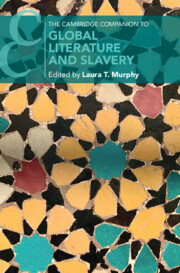Book contents
- The Cambridge Companion to Global Literature and Slavery
- The Cambridge Companion to Global Literature and Slavery
- Copyright page
- Contents
- Contributors
- Acknowledgments
- Chronology
- Introduction
- Part I Contexts and Contestation
- Part II Forms and Figures
- Part III Legacies and Afterlives
- Chapter 8 Slavery and the Virtual Archive: On Iran’s Dāsh Ākul
- Chapter 9 Impossible Revolutions? The Contemporary Afterlives of the Medieval Slave Rebellion of the Zendj
- Chapter 10 Slavery and Indenture in the Literatures of the Indian Ocean World
- Chapter 11 Rehearsing the Past
- Part IV Metaphors and Migrations
- Further Reading
- Index
- Cambridge Companions To …
Chapter 11 - Rehearsing the Past
The Terrestrial Middle Passage in Uwem Akpan’s “Fattening for Gabon”
from Part III - Legacies and Afterlives
Published online by Cambridge University Press: 15 December 2022
- The Cambridge Companion to Global Literature and Slavery
- The Cambridge Companion to Global Literature and Slavery
- Copyright page
- Contents
- Contributors
- Acknowledgments
- Chronology
- Introduction
- Part I Contexts and Contestation
- Part II Forms and Figures
- Part III Legacies and Afterlives
- Chapter 8 Slavery and the Virtual Archive: On Iran’s Dāsh Ākul
- Chapter 9 Impossible Revolutions? The Contemporary Afterlives of the Medieval Slave Rebellion of the Zendj
- Chapter 10 Slavery and Indenture in the Literatures of the Indian Ocean World
- Chapter 11 Rehearsing the Past
- Part IV Metaphors and Migrations
- Further Reading
- Index
- Cambridge Companions To …
Summary
The essay begins by discussing the debatable relationship between narratives of Black Atlantic chattel slavery and discourses of contemporary slavery in a global context. While some scholars are wary about conflating two different historical experiences, others see a useful link between past slavery and current trafficking. Uwem Akpan’s story “Fattening for Gabon” invokes the earlier trajectory of chattel slavery to the Americas but insists on a specific, local history of enslavement within Nigeria that locates it within a growing literature revealing West African internal involvement in past and present slave trade and trafficking. By restricting a global trafficking route to one origin in Nigeria, Akpan emphasizes local conditions of poverty and societal breakdown that lead to child trafficking in Nigeria and other African countries. I argue that even if Akpan ultimately borrows from the conventional slave narratives of the Black Atlantic, his attention is not solely or even primarily on the Middle Passage but on the First Passage when Africans captured other Africans to bring them to the coast for trade. Past and present are brought together in a continuum rather than as the rupture of the Middle Passage.
Keywords
- Type
- Chapter
- Information
- The Cambridge Companion to Global Literature and Slavery , pp. 185 - 198Publisher: Cambridge University PressPrint publication year: 2022

